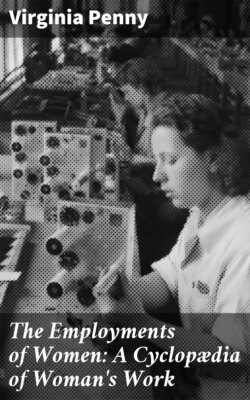Читать книгу The Employments of Women: A Cyclopædia of Woman's Work - Virginia Penny - Страница 28
На сайте Литреса книга снята с продажи.
22. Proof Readers.
ОглавлениеTable of Contents
The reading of proof has become a regular branch of business. Many of the large houses in cities where publishing is done, employ persons expressly for this purpose. We think proof reading opens a charming prospect to the employment of cultivated women. Girls could just as well be trained to read manuscripts aloud, for proof readers to correct their first sheets by, as boys. A proprietor of one of the largest publishing houses in this country kindly furnished us a reply to the question, what are the duties of a proof reader, and are ladies ever so employed? Hoping it will not be considered a breach of courtesy to use the reply, we give it in the words of the writer: "Proof reading consists in the reading of proofs, marking the errors, and making the work typographically correct. A good proof reader ought to be a practical printer, as there are a thousand minute details which one can hardly learn except by daily experience at the composing case and imposing stone. In addition to this he should have more or less knowledge of various languages, ancient and modern, and be well informed in history, art, and science. Proof reading is considered the best situation in a printing office; and the most intelligent printers usually gain and hold these situations. We know of no case in which this duty is performed by a woman; the cases must be rare indeed in which one has had an opportunity to qualify her for performing its duties. Moreover, it is a position the duties of which must be performed in the printing office." It is true that proof reading must be done in the printing establishment; but separate rooms, we believe, are always provided for proof readers. So ladies need not be frightened by supposing they must do their reading in the composition room. One of the firm of the Boston Stereotype Foundry writes: "We employ but three young ladies to read proof, and pay from $3 to $5 per week. They are Americans, and work nine hours. At one time we employed women in the type-setting department, who received two thirds of the price paid to men. Women are paid less than men because they are women, and because plenty can be found. Women possessing a good English education can learn in two months—if apt, become expert. They commence at $3, and finally get $5. The prospect of employment is good for a few. Occasionally there is a dull time, which affords opportunity for a little sewing, &c. Unless very dull, the occupant retains her position and wages. Good workmen consider women an innovation. To sum up the whole matter in a few words, women (barring the heavy work) can perform the labor appertaining to proof reading and type setting as well as men." A lady told me that one of her daughters assists her father with his newspaper. She reads the proof, looks up articles he wants, helps select matter for the paper, and translates French stories for his paper. Her services are worth to him from $500 to $600 a year. On visiting the Bible House, I learned that a lady is there employed as proof reader. She corrects both in English and German. Four or five male proof readers are employed, but she is the only lady. She gets $5 or $6 a week. The principal proof reader gets $12 a week. "Accuracy, quickness of eye, thorough knowledge of orthography, grammar, and punctuation, with a knowledge of languages, and a vast deal of learning and general intelligence, are necessary for a proof reader. An intuitive perception, arising from this cultivation, enables one to detect errors immediately, often without knowing how and why."
